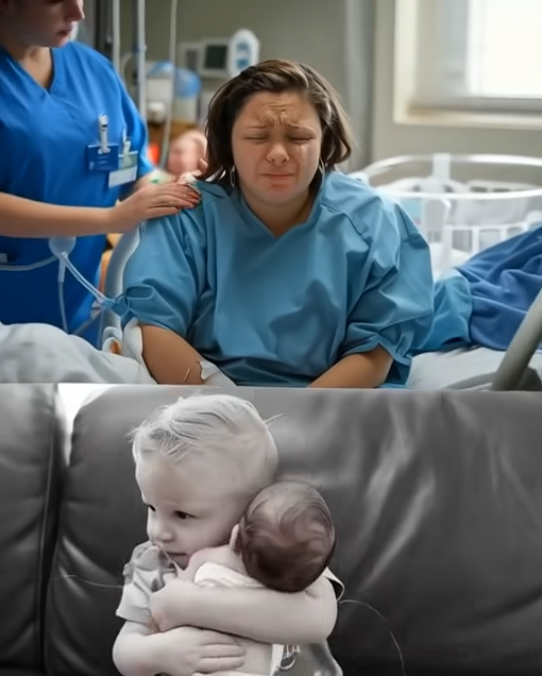Rachel leaned back into the armchair, her hand resting gently over her swollen belly. Nine months along, each tiny movement felt like waves shifting beneath her skin. Across the room, her seven-year-old, David, knelt on the carpet, arranging toy dinosaurs in neat rows. His voice rang with excitement as he described the “secret hideouts” in the backyard that he couldn’t wait to show his little brother.
“Mom, do you think he’ll like dinosaurs?” he asked, eyes sparkling.
“I know he will,” Rachel said softly, brushing a loose strand of hair from her face. “And he’ll love having you as his big brother.”
David pressed his ear against her stomach. A sudden kick made him jump back, then beam with delight. “He said hello!” he shouted.
Just then, Ralph came rushing in—tie crooked, briefcase in hand. He kissed Rachel, tousled David’s hair, and said warmly, “Not long now, champ. A few more days and he’ll be here.”
But the very next day, everything turned upside down.
That afternoon, Rachel collapsed suddenly in the kitchen. The sound of her fall sent David sprinting in. She lay pale on the floor, struggling to breathe. “Call… an ambulance,” she gasped.
David’s little hands shook as he dialed 911, his voice trembling through tears as he gave their address. Within minutes, sirens wailed into the driveway. Paramedics rushed in, and though David clung desperately to her hand, they soon lifted her onto a stretcher and into the ambulance.
At the hospital, Ralph arrived just as doctors were preparing for emergency surgery. Dr. Erica, the obstetrician, explained with urgency, “Placental abruption. Both mother and baby are at risk. We have to act immediately.”
Ralph knelt to steady David, forcing a calm he didn’t feel. “Mom is strong. The doctors are helping her.”
Inside the operating room, machines beeped frantically. Rachel’s heart wavered, the baby’s position complicated everything. A nurse pulled Ralph aside, speaking quietly. When told a choice might need to be made, his voice cracked: “Save Rachel. Please save my wife.”
Hours later, the surgery ended. Rachel lived. But when their baby was delivered, silence filled the room. No cry. No movement.
A nurse swaddled the tiny boy in white and explained gently that it was time to say goodbye. Rachel, trembling, could barely nod. Before anyone else could speak, David stepped forward, his small voice steady: “I want to see my brother. I promised I’d protect him.”
Rachel’s sister Ruby objected. “He’s just a child. This could scar him.”
But Rachel met David’s eyes. “He’s loved him from the start. He deserves this.”
The nurse placed the baby in David’s arms. The boy cradled him carefully, as though holding a fragile bird. The room hushed. Machines, footsteps, whispers—everything fell still.
David bent close and whispered, “Don’t worry. I promised I’d protect you.”
At first there was nothing. Then—a tiny whimper. A second. Then a cry, clear and strong.
Rachel sat bolt upright. “Did you hear that?”
Ralph gripped the bedrail, stunned. “He’s alive… he’s crying.”
Dr. Erica rushed forward, stethoscope in hand, checking vitals with trembling fingers. Her voice broke: “Heartbeat strong. Breathing. This is remarkable.”
Rachel wept, clutching both her sons. Ralph bowed his head, tears streaming. Even Ruby, who had protested, whispered through her tears, “Thank you, God.”
The miracle spread through the corridor. Nurses peeked in with shining eyes. Doctors paused, reverent. A child thought gone had found his cry in his brother’s arms.
Later, when calm returned and the baby lay warm against Rachel’s chest, Ralph knelt by David. “Son, how did you do that?”
David wiped his face. “I told him I’d protect him. He just needed me to keep my promise.”
Rachel kissed his hair. “You’re our hero.”
In the days that followed, the medical team kept careful watch—oxygen, reflexes, feeding. Dr. Erica avoided grand claims, but admitted quietly, “Sometimes love does what medicine alone cannot.”
By morning, the Winter family shifted from shock into gratitude. Neighbors helped, Ruby returned with an apology, and David—who barely slept—asked to hold his brother again. When the nurse placed the baby back into his arms, the room stilled in peace.
At home, recovery was slow but steady. Ralph took leave from work. Rachel healed, nursing gently. And every day, David took his “big-brother shift,” swaddling, fetching diapers, and singing his goofy “dinosaur lullaby” that somehow always worked.
Rachel often replayed that night in her mind—the silence, the ache, the cry that changed everything. She didn’t try to explain it away. She held the miracle close, grateful for both science and love.
What they learned stayed with them:
Love is action—a phone call, a whispered promise, a steady embrace.
Small acts can change outcomes.
Hope arrives quietly, sometimes in a single cry.
Months later, she watched her boys in the yard. David gave his baby brother a “dino tour,” pointing out cardboard caves and secret hideouts. The baby gurgled with joy. Rachel laughed through her tears.
Their crisis hadn’t broken them. It had remade them—not into people untouched by pain, but into a family held together by love. They didn’t have a perfect story, but they had a true one: a quiet room, a brave child, and a cry that bound them forever.
